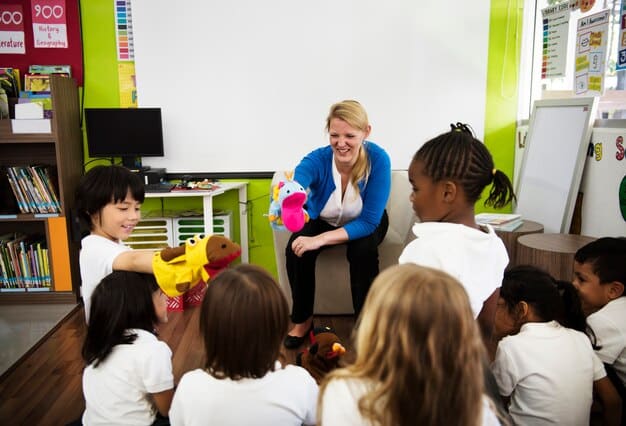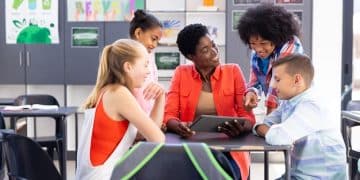Updated National Curriculum Framework 2025: Your Child’s Future Education

The Updated National Curriculum Framework for 2025 signifies a transformative shift in educational philosophy, moving towards a holistic, skill-based, and student-centric approach designed to better prepare children for modern challenges and future opportunities, emphasizing experiential learning and critical thinking.
As parents and educators, understanding significant shifts in the educational landscape is paramount. The Updated National Curriculum Framework for 2025 ushers in a new era for learning, promising profound changes that will directly impact your child’s educational journey. This comprehensive overview aims to demystify these updates, offering clarity on what they truly mean for students across the nation.
Understanding the Core Philosophy Behind the 2025 Updates
The 2025 National Curriculum Framework (NCF) updates represent more than just a revision; they embody a fundamental reshaping of educational goals and methodologies. At its heart, this framework seeks to move beyond rote learning, aiming to cultivate critical thinking, creativity, and problem-solving skills essential for a rapidly evolving world.
The previous curriculum, while foundational, often prioritized memorization over comprehension. The new NCF, however, champions a holistic development approach, recognizing that a child’s education extends far beyond textbooks and standardized tests. It integrates academic rigor with emotional intelligence, ethical reasoning, and practical life skills, striving for a well-rounded individual.
A Shift Towards Experiential Learning and Interdisciplinary Studies
A cornerstone of the updated framework is the emphasis on experiential learning. This means less passive reception of information and more active engagement through projects, discussions, and real-world applications. The idea is that learning by doing solidifies understanding and develops practical competencies. This active methodology extends to various subjects, fostering deeper connections between theoretical knowledge and its practical relevance. For example, a science lesson might involve hands-on experiments rather than just reading about them.
- Encourages hands-on activities and project-based learning.
- Promotes understanding through real-world application.
- Fosters deeper comprehension and retention of concepts.
Furthermore, the NCF advocates for interdisciplinary studies, breaking down traditional subject silos. This approach allows students to see the interconnectedness of knowledge, preparing them to tackle complex challenges that often require insights from multiple fields. For instance, a history lesson might incorporate elements of economics, sociology, and art, showing how these disciplines intertwine to shape human civilization. This integration helps students develop a more comprehensive and nuanced understanding of global issues and personal development.
Promoting Critical Thinking and Personalized Learning Paths
One of the most significant shifts is the deliberate push towards nurturing critical thinking. The curriculum encourages students to question, analyze, and synthesize information, rather than merely accepting it at face value. This skill is vital in an age saturated with information, enabling students to discern credible sources and form well-reasoned opinions. Teachers are now encouraged to facilitate debates, encourage independent research, and provide opportunities for students to challenge existing ideas constructively.
Another pivotal aspect is the recognition of personalized learning. The NCF acknowledges that every child is unique, with different learning styles, paces, and interests. While not fully individualized for every student, the framework provides guidelines for incorporating flexible learning pathways, allowing for more differentiated instruction. This might involve teachers offering various resources, activities, or assessment methods to cater to diverse needs within the same classroom environment. This adaptability aims to maximize each child’s potential, ensuring that no one is left behind and that advanced learners are simultaneously challenged.
Key Subject Area Changes and Their Implications
The updated National Curriculum Framework introduces significant modifications across various subject areas, each designed to reflect the evolving demands of the 21st century. These changes are not merely cosmetic; they aim to deepen understanding, foster practical skills, and cultivate a more holistic educational experience for students.
In Mathematics, the focus is shifting from abstract calculations to conceptual clarity and problem-solving. While foundational arithmetic remains crucial, the curriculum now emphasizes applying mathematical principles to real-world scenarios. Students will engage more with data analysis, logical reasoning, and spatial understanding, preparing them for careers that increasingly demand quantitative literacy. This shift aims to make math more engaging and relevant, diminishing the common perception of it being purely theoretical.
Language Arts: Cultivating Communication and Literacy in a Digital Age
Language Arts will see a greater emphasis on communicative competence and media literacy. Beyond traditional reading and writing, the curriculum will incorporate aspects of digital storytelling, effective online communication, and critical evaluation of information consumed through various digital platforms. The ability to articulate thoughts clearly, both orally and in writing, is paramount, and the new framework encourages creative expression through diverse mediums.
- Strengthens oral and written communication skills.
- Introduces digital literacy and media consumption.
- Encourages creative expression through various forms.
The goal is to equip students not just with the ability to understand text, but to create meaningful narratives, participate constructively in public discourse, and navigate the complexities of information in a digital landscape. This includes understanding satire, propaganda, and bias, fostering a more discerning and responsible generation of digital citizens.

Science and Social Studies: Interconnectedness and Global Perspectives
Science education under the new framework stresses inquiry-based learning and the scientific method. Students will be encouraged to formulate hypotheses, design experiments, analyze data, and draw conclusions, mimicking the actual practice of science. There is also an increased focus on the interconnectedness of scientific disciplines, such as environmental science and technology, highlighting their impact on society and individual lives. This holistic view of science aims for a deeper understanding of complex global challenges.
Similarly, Social Studies will adopt a more interdisciplinary and global approach. Instead of merely memorizing historical dates or geographical facts, students will explore socio-political and economic issues from multiple perspectives. The curriculum will emphasize civic engagement, ethical considerations, and an understanding of diverse cultures and global interdependence. This aims to foster responsible and empathetic citizens who are aware of their role in a broader human context.
The Role of Assessment and Evaluation in the New Framework
The National Curriculum Framework for 2025 is not just about what is taught, but also about how learning is measured. The updated assessment and evaluation system moves away from a sole reliance on high-stakes summative tests, aiming for a more continuous, comprehensive, and authentic evaluation of student progress and understanding. This shift reflects a desire to reduce undue pressure on students while providing a more accurate picture of their capabilities.
Formative assessments will play a much more prominent role. These ongoing evaluations, such as quizzes, class discussions, and project work, are designed to provide timely feedback to both students and teachers. The goal is to identify learning gaps early on and adjust teaching methodologies accordingly, ensuring that students receive the support they need to master concepts. This iterative process fosters a growth mindset, where mistakes are seen as opportunities for learning rather nation failures.
Moving Beyond Rote Memorization: Competency-Based Assessments
A crucial aspect of the new assessment paradigm is the move towards competency-based evaluations. This means tests and assignments will increasingly measure a student’s ability to apply knowledge and skills in practical, real-world contexts, rather than just recalling facts. For example, instead of merely defining historical events, students might be asked to analyze their causes and consequences or propose solutions to contemporary problems using historical parallels.
- Shifts focus from memorization to practical application of knowledge.
- Assesses problem-solving and critical thinking skills.
- Utilizes diverse methods like projects, presentations, and portfolios.
Similarly, various assessment methods will be employed, including portfolios, presentations, group projects, and practical demonstrations. This diversified approach acknowledges that different students excel in different areas and that a single test cannot capture the full spectrum of a child’s abilities. The aim is to create a more equitable and holistic assessment system that nurtures diverse talents and offers a more complete picture of learning.
The Importance of Continuous Feedback and Self-Assessment
The updated framework also emphasizes the importance of continuous feedback, both from teachers to students and through peer and self-assessment. Students will be encouraged to reflect on their own learning processes, identify their strengths and weaknesses, and set personal learning goals. This fosters greater autonomy and metacognition, empowering students to take ownership of their educational journey. Teachers will act more as facilitators, guiding students through reflective practices and providing constructive, actionable feedback.
This comprehensive evaluation model aims to provide a more nuanced understanding of each student’s progress, focusing on their growth trajectory rather than just their performance at a single point in time. It seeks to reduce the anxiety often associated with traditional testing and instead promote a love for learning and continuous improvement.
Empowering Teachers: Training and Resources for the New Curriculum
The success of the updated National Curriculum Framework hinges significantly on the capabilities and preparedness of teachers. Recognizing this, the 2025 NCF emphasizes robust and continuous professional development programs. The shift towards experiential learning, interdisciplinary studies, and competency-based assessments requires educators to adapt their pedagogical approaches, necessitating comprehensive training initiatives.
Teacher training programs will focus on equipping educators with the skills to implement the new methodologies effectively. This includes workshops on designing project-based learning activities, facilitating critical discussions, integrating technology into the classroom, and employing diverse assessment strategies. The aim is to move teachers from being mere dispensers of information to facilitators of engaging and dynamic learning environments.
Developing a Collaborative Learning Community Among Educators
Beyond formal training, the framework encourages the creation of collaborative learning communities among educators. This involves fostering environments where teachers can share best practices, discuss challenges, and collectively develop innovative solutions. Peer learning, mentorship programs, and professional learning networks will be instrumental in building a supportive ecosystem for teachers to navigate the curriculum changes effectively.
- Provides ongoing professional development through workshops and seminars.
- Fosters collaborative learning communities among teachers.
- Offers access to updated digital resources and pedagogical tools.
The NCF also recognizes the diverse needs of teachers across various regions and educational settings. Therefore, training and resources will be tailored to address specific contexts, ensuring relevance and accessibility for all educators. This localized approach is crucial for successful implementation, understanding that a one-size-fits-all model may not be effective. This tailored support helps teachers address unique challenges in their classrooms, promoting equitable access to high-quality instruction.

Providing Comprehensive Digital and Pedagogical Resources
To support teachers in implementing the new curriculum, a wealth of digital and pedagogical resources will be developed and made accessible. These resources will include updated textbooks, interactive online modules, lesson plans aligned with the new framework, and multimedia content. The integration of technology is crucial, not just as a tool for teaching but also as a means for teachers to access continuous learning opportunities and connect with a wider community of educators.
Furthermore, there will be an emphasis on creating a bank of open educational resources (OERs) that teachers can freely access, adapt, and share. This collaborative approach to resource development will empower teachers to customize materials to suit their students’ specific needs and learning styles. By investing in teacher empowerment through comprehensive training and abundant resources, the NCF aims to ensure that educators are well-prepared to deliver the transformative education envisioned by the new framework.
Parental Involvement: A Crucial Pillar for Success
The success of any educational reform, especially one as comprehensive as the Updated National Curriculum Framework for 2025, heavily relies on the active involvement and understanding of parents. The new framework recognizes parents not just as observers but as crucial partners in a child’s learning journey. Their engagement can significantly amplify the positive impacts of the curriculum changes, fostering a more cohesive and supportive environment for students.
Educating parents about the changes is a key component. Schools are encouraged to organize workshops, informational sessions, and clear communication channels to explain the philosophy, objectives, and practical implications of the new curriculum. Understanding the shift towards experiential learning, competency-based assessments, and interdisciplinary studies can help parents align their support at home with the school’s educational goals, reinforcing learning outside the classroom.
Fostering a Collaborative Learning Environment at Home and School
The updated framework advocates for a strong home-school partnership. This means encouraging parents to engage with their children’s learning in more meaningful ways than just monitoring homework. It involves fostering analytical thinking through conversations, encouraging exploration of interests, and supporting projects that extend beyond traditional academic boundaries. Parents can play a vital role in nurturing the critical thinking and problem-solving skills the new curriculum champions.
- Attending informational workshops and parent-teacher meetings.
- Engaging in discussions at home about school projects and concepts.
- Encouraging independent learning and critical thinking.
Moreover, active parental involvement can help bridge the gap between theoretical knowledge and practical application. For instance, if the curriculum emphasizes environmental awareness, parents can engage children in eco-friendly practices at home or participate in community initiatives. This real-world reinforcement helps children connect their schooling to their everyday lives, making learning more relevant and impactful. This holistic approach helps to cement concepts learned at school.
Addressing Parental Concerns and Building Trust
Inevitably, significant curriculum changes can bring about questions and concerns from parents. The framework emphasizes the importance of open communication channels where parents can voice their apprehensions and seek clarity. Schools are urged to establish transparent processes for feedback and address concerns promptly and effectively. Building trust between parents and the educational institution is paramount for the successful implementation of the new NCF.
Ultimately, when parents are well-informed, engaged, and feel heard, they become powerful advocates and active participants in their child’s educational journey. This shared responsibility ensures that the benefits of the Updated National Curriculum Framework are fully realized, providing students with the best possible environment to thrive academically, socially, and emotionally.
Anticipating the Long-Term Benefits and Challenges
The Updated National Curriculum Framework for 2025 is poised to bring about numerous long-term benefits for students, preparing them more effectively for the complexities of adult life and the demands of future careers. By fostering critical thinking, creativity, and interdisciplinary problem-solving, the framework aims to cultivate adaptable and resilient individuals. Graduates under this new system are expected to possess not just academic knowledge, but also the soft skills highly sought after in the global workforce, such as collaboration, communication, and emotional intelligence.
One of the primary benefits is the potential for a more engaging and joyful learning experience. When education moves beyond rote memorization to active exploration and hands-on activities, students are more likely to develop a genuine love for learning. This intrinsic motivation can lead to lifelong intellectual curiosity and continuous personal growth, far beyond their formal schooling years.
Navigating Implementation Challenges and Ensuring Equity
Despite the promising benefits, the implementation of such a comprehensive framework is not without its challenges. A significant hurdle will be ensuring equitable access to the new educational model across all schools, especially those in underserved areas. Disparities in resources, teacher training, and technological infrastructure could inadvertently create a two-tiered system, exacerbating existing inequalities.
- Requires significant investment in teacher training and resources.
- Faces challenges in ensuring equitable implementation across diverse regions.
- Demands continuous adaptation and evaluation to remain relevant.
Another challenge involves the sheer scale of the change required. Re-training thousands of educators, developing new teaching materials, and overhauling assessment systems will demand substantial financial investment, effective logistical planning, and unwavering commitment from policymakers at all levels. Resistance to change from various stakeholders, including some parents and teachers accustomed to traditional methods, may also need to be carefully managed through clear communication and demonstrated success.
Sustaining the Vision: Continuous Adaptation and Feedback
For the NCF to truly achieve its long-term objectives, it must not be a static document. The educational landscape, like the world itself, is constantly evolving. Therefore, continuous evaluation, feedback mechanisms, and periodic revisions will be essential to ensure the framework remains relevant and effective. This adaptive approach will allow for fine-tuning based on real-world outcomes and emerging educational research, preventing the curriculum from becoming outdated.
Ultimately, the long-term success of the 2025 National Curriculum Framework will depend on a collective commitment from all stakeholders—policymakers, educators, parents, and students—to embrace innovation, address challenges proactively, and continuously strive for an education system that truly empowers children for a prosperous future.
| Key Aspect | Brief Description |
|---|---|
| 🧠 Holistic Development | Moves beyond rote learning to cultivate critical thinking, creativity, and problem-solving skills. |
| 💡 Experiential Learning | Emphasizes hands-on activities and real-world application, integrating academic rigor with practical skills. |
| 📈 Assessment Evolution | Shifts to competency-based, continuous, and diverse evaluations, moving away from high-stakes testing. |
| 🤝 Parental Partnership | Recognizes parent involvement as crucial for reinforcing learning and bridging home-school gaps. |
Frequently Asked Questions About the 2025 Curriculum Updates
The main objective of the 2025 framework is to cultivate well-rounded individuals equipped with critical thinking, creativity, and problem-solving skills. It aims to move beyond rote learning, focusing on a holistic development that integrates academic knowledge with practical life skills and emotional intelligence, better preparing students for future challenges and opportunities in the modern world.
Your child will experience a shift toward more experiential and hands-on learning, with projects, group discussions, and real-world applications becoming more central. The curriculum emphasizes interdisciplinary studies, allowing students to see the connections between different subjects. This approach promotes deeper understanding and encourages active engagement, making learning more dynamic and relevant for students.
Assessments will become more continuous, comprehensive, and competency-based, moving away from solely reliance on single high-stakes tests. There will be an increased use of formative assessments, portfolios, presentations, and practical demonstrations to measure a student’s ability to apply knowledge and skills. This diversified approach aims to reduce stress and provide a more accurate picture of a child’s overall learning progress.
Teachers will undergo robust and continuous professional development, focusing on new pedagogical approaches such as project-based learning and diverse assessment strategies. The framework encourages collaborative learning communities among educators and provides access to extensive digital and pedagogical resources. This comprehensive support aims to empower teachers to effectively implement the new, transformative curriculum in their classrooms.
Parental involvement is crucial. Parents are encouraged to participate in informational sessions, foster collaborative learning at home, and engage in discussions about the curriculum changes. By understanding and reinforcing the new educational philosophy, parents become vital partners in their child’s learning journey, helping to bridge the gap between school and home and amplify the positive impacts of the updated curriculum.
Conclusion
The Updated National Curriculum Framework for 2025 signifies a profound and necessary evolution in education, moving towards a more dynamic, inclusive, and skill-oriented approach. It promises to equip children with the resilience, creativity, and critical thinking abilities essential for navigating an ever-changing world. While the journey of implementation will undoubtedly present its challenges, the long-term benefits of fostering well-rounded, adaptable, and engaged learners hold immense promise for the future generation, making their educational path more relevant and rewarding than ever before.





